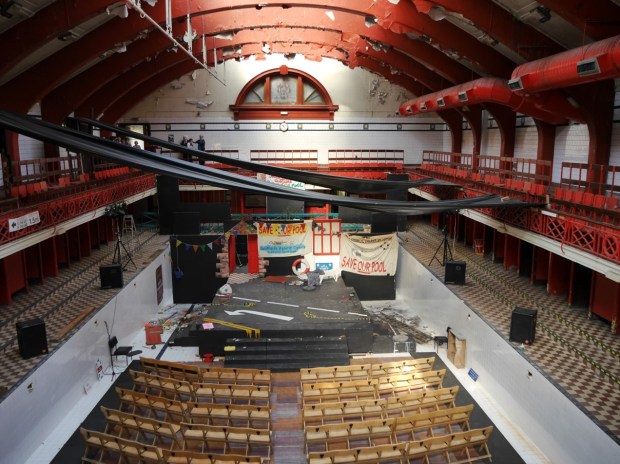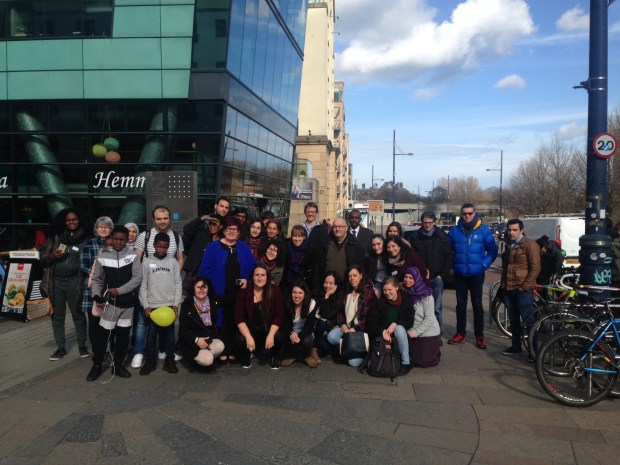Laura Beattie is a PhD student in English Literature at the University of Edinburgh. Her research looks at ideas of community, citizenship, the household and the commonwealth in Shakespeare’s comedies and she is interested more generally in ideas of citizenship and belonging.
Recently I have been involved in running a public engagement project, initiated and led by Sibyl Adam, one of my colleagues at the University of Edinburgh, along with three other PhD students: Sarah Stewart (Edinburgh), Moira Hansen (Glasgow) and Agnese Sile (Aberdeen). Our project is called Spaces of Belonging: Researcher-Led Walking Poetry Workshops and was funded by the University of Edinburgh’s Innovative Initiative Grant and SGSAH’s Cohort Development Fund. We ran these workshops in association with The Welcoming charity in Edinburgh and Maryhill Integration Network in Glasgow, community groups which engage with people of a migrant, refugee or asylum seeker background.

Holyrood Park, location of our first Edinburgh workshop. Picture courtesy of Sibyl Adam
During a period of six weeks, we ran eleven different workshops, five in Glasgow and six in Edinburgh, each ran by two, or sometimes three, different PhD students. All of our workshop leaders did a fantastic job, creating interesting and varied workshops – thank you to all!

Govanhill Baths, location of our first Glasgow workshop. Picture courtesy of Wikimedia Commons
You can read more about the project on our website but essentially the aim was two-fold: firstly, we wanted to engage an audience of migrant, refugee and asylum seeker backgrounds with ideas of spaces and belonging and help them express these ideas through the medium of poetry. Secondly, we wanted to give PhD students from across Scotland the chance to gain hands on experience of public engagement.
As we come to the end of the project, I thought it might be useful to list a few of the things we have learnt along the way (or wish we’d known earlier!):
Be bold
When you first have an idea for a project, and it only exists inside your head, it can be a bit daunting trying to think about how you can make it a reality. Talk to other people about it, see what they think about your idea and if they would be willing to collaborate with you. For public engagement projects, it is often necessary to involve non-academic partners and I think PhD students can often be particularly shy about approaching them (imposter syndrome appears again!). Before approaching a potential partner, think about what you have to offer them. Be very clear from the outset about the expectations and responsibilities of each partner involved. The chances are you have something very substantial to offer an outside partner, so don’t be afraid to ask – the worst that can happen is that they (probably very politely) say no and are flattered to have been asked!
Expect the unexpected
In running the workshops themselves, the biggest lesson we learnt was to expect the unexpected. This applied across a range of factors, one of the biggest being that we had no way to tell in advance how many people would show up to each workshop. This meant that the number of participants ranged from only two to up to sixteen and that the plans for the workshop had to be varied accordingly. Something else we didn’t expect was that people were often late (sometimes up to an hour or more) because they were fitting the workshop into their already busy lives. In summary, be ready to think on your feet!
Remember who your audience are
The key takeaway point of this blog post is this: remember your audience! This is important both in terms of planning and delivery. On the planning side, one of the reasons why we only had two people turn up to one of the workshops was because it took place on a bank holiday. This meant that many of our usual participants were busy with family commitments. We also realised at some point that it would be a good idea to provide crèche facilities so people with young children could attend. However, it proved to be much more complicated and expensive than we initially thought meaning that we were unable to implement it.
In terms of delivery, remember that although you may have certain aims, in our case engaging the participants with themes of spaces and belonging, the participants themselves may come to your project with very different aims in mind. We very quickly got the sense from our participants that their main motivations for coming to the workshops were to have fun, see places in the city they hadn’t visited before, and be sociable. This doesn’t mean that they weren’t also interested in engaging with our themes but it does mean that the most important thing for us was to be friendly, chatty and try not to sound too dry and academic otherwise we would quickly have lost the interest of our audience!

A group of those who attended our final celebration in Edinburgh. Picture my own.
Last, but certainly not least, don’t forget why you wanted to do the project in the first place. Although it can be a lot of work, it can also be incredibly rewarding. We held our final event last weekend to celebrate the end of the project, where we brought together over fifty of the people who had been involved. It was touching and gratifying for us to see how much everyone had enjoyed participating and we want to express our thanks and gratitude to all who helped bring this project to life! I would also like to say special thanks to Sibyl Adam, without whose tireless commitment it would not have been possible.
Thanks to Laura for sharing her experiences of working on this brilliant project. If you have organised or attended an interesting PhD event and would like to write a post about it please get in touch! Guidelines on submitting posts available here.

Hi Laura, thanks for this super account and for sharing your project! I wonder if you know of my project, The Walking Library? Useful synergies there I think. https://walkinglibraryproject.wordpress.com/
Dee
LikeLike
Hi Dee,
No I didn’t know about your project, thanks for letting me know – yes, very useful synergies indeed! I will check out some of your and Misha’s work that you mention on the website because I think it could help us think further about the theoretical background to the project, especially because we are thinking of doing something similar in the future but based on theatre rather than poetry. The Walking Artists Network looks very interesting too!
Laura
LikeLike